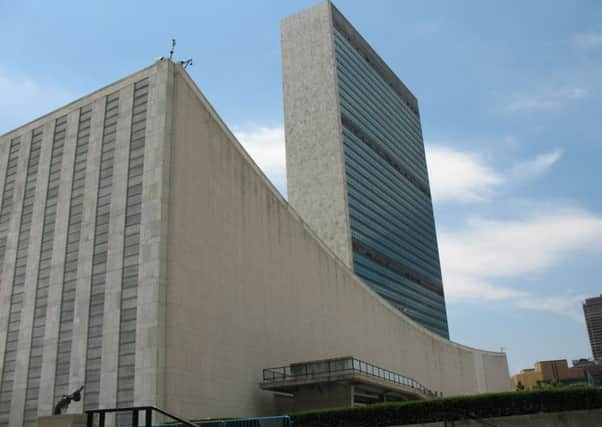Liz Grant: New York summit addresses world ills


Last weekend in New York City, delegates and leaders from 193 nations gathered at the headquarters of the United Nations to decide how best to deliver a set of pledges designed to address the major ills of the world: hunger, poverty, illness. That meeting is now over but the question remains, are these goals achievable?
The 17 Sustainable Development Goals (SDGs), which replace the Millennium Development Goals, are as ambitious as they are broad. They cover five key themes: People, the Planet, Prosperity, Peace and Partnership and will commit each of the UN’s member countries to “end poverty by 2030, promote shared economic prosperity, social development and environmental protection”. No small task – but how can we in Scotland get involved and play our part?
Advertisement
Hide AdAdvertisement
Hide AdAt the University of Edinburgh, we’re developing ways to contribute to the debate on these wide-ranging Sustainable Development Goals.
On 24 September, the day before the UN summit in New York, the University’s Global Health Academy hosted a gathering of influential organisations in the City, to discuss how we can contribute to implementing the SDGs. The message was clear, in today’s world of inequalities there needs to be a renewed energy in redistribution of the tools, skills and resources that can enable people to live better.
Tools and skills are what business, government and universities have in abundance to tackle real global issues, such as in streamlining health service procedures, targeting resources quickly to the point of greatest need (such as in an epidemic); training workforces and providing the right equipment, we can effect real and lasting change. Ensuring businesses big and small are part of the solution is, I believe, another key requirement. Too often profit is a word avoided in such meetings, but as many attendees highlighted, businesses do more than simply make profit. By developing creative partnership models between business and not-for-profits groups, new ways to tackle problems can be found that can include business people, whose expertise and resources can make the difference between success and failure.
We spoke also of the potential of young people to help deliver this change. In many developing countries, youngsters have often to take on family responsibilities from a young age, resulting in missed education and poor job prospects. By assisting such groups, we can help them use many of the skills they may already possess, allowing them to help both themselves and their communities.
The group also agreed that by utilising ‘big data’ - where personal information is gathered from thousands of people and analysed for trends – traditional healthcare models of diagnoses and treatment can be added to, by examining long-term patterns. With Edinburgh’s School of Informatics a world-leader in Big Data, I see real opportunities for us to make a difference.
The University is already putting theory into practice. For example, our programme to eradicate Sleeping Sickness in Uganda works with community groups, local farmers, and universities and hospitals to train healthcare professionals. Similarly, we are working in Kenya, Rwanda, Uganda and Zambia to fully integrate palliative care services into national health systems and train health professionals. But our Perhaps our most significant contribution is the training and education we provide to students, staff, alumni, and partners who effect change in many ways.
• Liz Grant is director of the Global Health Academy at the University of Edinburgh